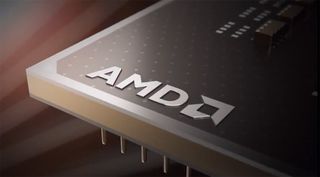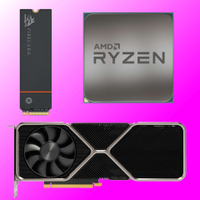Hackers claim to have carried off an enormous data heist on AMD, selling info on employee and customer information, future products and specs
Remember folks, nothing is 100% secure when you store it via a remote service.

Data breaches are so common these days that even when they hit the headlines, most people don't really pay much attention. But when the target in question is AMD, the main barrier to the chip industry being monopolised by two particular companies, you can be sure that the PC industry will not leave this event unnoticed.
News of the breach was reported by PC Mag, referencing a post on X that shows a claim made by hacking group IntelBroker that it had captured a significant amount of confidential information from a third-party hosting company used by AMD. Up for sale are databases of customers and employees, information on future products, specifications, ROM files, source code, firmware, and other sensitive data.
PC Mag also reports that AMD responded to a query about the breach: "We are aware of a cybercriminal organization claiming to have stolen AMD data. We are working closely with law enforcement officials and a third-party hosting partner to investigate the claim and the significance of the data."
In the past, IntelBroker has successfully targeted Europol, the EU's law enforcement agency, and UK-based bank Barclays. As other sources on X are claiming to have AMD's material for sale, it would seem that the group does have its hands on the confidential data.
The obvious questions to ask here are how did this happen and what's the potential impact on AMD? The former can't be answered right now as AMD hasn't officially confirmed that the breach has even taken place but the fact that it mentions a "third-party hosting partner" strongly suggests that a file hosting service hasn't been as secure as AMD expected, and that was the entry point for IntelBroker.
How damaging this data breach is depends on just how comprehensive the haul is—for example, PC Mag notes that in a screenshot of AMD employees' details, all of the entries are marked as inactive. This suggests that some of the information is no longer relevant, but that simply could be a case of IntelBroker not wanting to release 'genuine' material for free.
I don't think any files on product specifications, current or forthcoming, will be especially useful to anyone, though. No major company within the PC industry would entertain the idea of getting hold of copies and the average person wouldn't be able to make use of the technical documents and files. However, as certain countries are heavily sanctioned against the import of chips and the like, any snippet of data that could aid their chip business would certainly be of interest to them.
The biggest gaming news, reviews and hardware deals
Keep up to date with the most important stories and the best deals, as picked by the PC Gamer team.
Even if IntelBroker's claims are total fabrication or the data haul itself is of little use, AMD and other major players in the chip industry are going to be looking very carefully at what third-party hosting companies they use in future, that's for sure.
Best CPU for gaming: Top chips from Intel and AMD.
Best gaming motherboard: The right boards.
Best graphics card: Your perfect pixel-pusher awaits.
Best SSD for gaming: Get into the game first.

Nick, gaming, and computers all first met in 1981, with the love affair starting on a Sinclair ZX81 in kit form and a book on ZX Basic. He ended up becoming a physics and IT teacher, but by the late 1990s decided it was time to cut his teeth writing for a long defunct UK tech site. He went on to do the same at Madonion, helping to write the help files for 3DMark and PCMark. After a short stint working at Beyond3D.com, Nick joined Futuremark (MadOnion rebranded) full-time, as editor-in-chief for its gaming and hardware section, YouGamers. After the site shutdown, he became an engineering and computing lecturer for many years, but missed the writing bug. Cue four years at TechSpot.com and over 100 long articles on anything and everything. He freely admits to being far too obsessed with GPUs and open world grindy RPGs, but who isn't these days?
Most Popular







